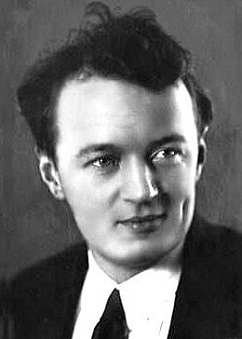Alexander Afinogenov (Alexander Afinogenov)

Playwright. One of the more talented Soviet playwrights to emerge in the years before World War II, he managed to retain his individuality in the face of Stalinist repression. Alexander Nikolayevich Afinogenov was born in Skopin, Russia, and raised in Yaroslavl. He had an early interest in literature, turning out three books of poetry while still in his teens. At 18 he joined the Communist Party and a year later his first play, “Robert Tim”, was staged at Moscow’s politically-oriented Proletkult Theatre. Following two years of study at the Moscow Institute of Journalism he settled in the Soviet capital in 1924. His early plays chronicled labor and class struggles at home and abroad, including “On the Other Side of the Gap” (1926), based on a Jack London story, “Look with Both Eyes!” (1927), and “The Trail of the Wolf” (1927). From the late 1920s Afinogenov was a prominent member of the militant Russian Association of Proletarian Writers (RAPP), which demanded that all literature be used to glorify the state and composed in a simplistic manner for easy assimilation by the public; but his two finest plays deviated from its narrow doctrine. “The Eccentric” (1929) satirized bureaucracy and anti-Semitism through the experiences of a zanily enthusiastic “fellow-traveler” (a non-communist who supports the state). With “Fear” (1931) he explored philosophical problems in Soviet society with honesty and psychological depth. In it a respected old scientist, unable to come to grips with his changed world, develops a theory that political solutions are useless because humankind is motivated by fear and self-interest. “There are 200 million people in Russia, and all of them are scared”, he declares. The ending rejects this notion with a paean of optimism for the future, but fear was very much on the minds of Soviet audiences as Josef Stalin’s power grew more oppressive – giving the play a topical ambiguity its author may or may not have intended. “Fear” was a huge hit in the USSR and successfully staged in Europe and the United States. It also caught Stalin’s attention and from then on the dictator took a personal interest in Afinogenov’s career. He emerged relatively unscathed after the Politburo discredited and abolished the RAPP in 1932, and was elected to the Presidium of the new Union of Soviet Writers in 1934. When Stalin objected to his play “The Lie” (1933), instead of banning it outright he personally rewrote the parts he thought were subversive. Afinogenov then focused on the safer topic of the fascist threat in the popular “Distant Point” (1935), and “Salute to Spain” (with music by Shostakovich, 1936). In 1937, at the height of the political purges, former members of the RAPP leadership were denounced as Trotskyites and subsequently “disappeared” (notably Vladimir Kirshon). Afinogenov was expelled from both the Communist Party and the Writers’ Union. Certain he would be arrested, he went into seclusion and kept an unusual diary in which he expressed his striving to be a faithful Soviet citizen and artist. Scholars have debated whether the politicized soul-searching was genuine or if the diary was written to mollify his potential interrogators in the NKVD (the secret police); in the end the arrest never took place. In early 1938 Afinogenov was suddenly declared “rehabilitated” and restored to his party and union memberships, probably on Stalin’s orders. His return to favor was sealed with the hit comedy “Masha” (1940) and two propaganda plays, “The Mother of Her Children” (1939) and “On the Eve” (1941). “Masha” remained in the repertory for many years and was made into a film. With the Nazi invasion of Russia in June 1941, Afinogenov was appointed head of the Soviet Information Bureau’s Literary Department. He was killed in a Luftwaffe air raid on Moscow, when a bomb struck the Central Committee building while he was there on business. He was 37. Some of his 26 plays have been translated into English. (bio by: Bobb Edwards)
Born
- April, 04, 1904
Died
- October, 10, 1941
Cemetery
- Novodevichy Cemetery
- Russia

